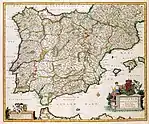The following is a timeline of the history of the city of Bilbao in the Biscay province of Spain.
Prior to 19th century
| History of Spain |
|---|
 |
| Timeline |
- 1300 – Bilbao founded by Diego López V de Haro.[1][2]
- 1397 – Santiago Cathedral built (approximate date).
- 1510 – Church of San Antón built.
- 1511
- Consulado established.[3]
- Basilica of Begoña construction begins.
- 1795 – July: Town occupied by French forces.[1][2]
19th century
- 1804 – Zamacolada conflict.[4]
- 1808 – French occupation begins.[2]
- 1813 – French occupation ends.[2]
- 1833 – Biscay Province established.
- 1836 – December: Battle of Luchana.
- 1845 – Arenal Bridge constructed.
- 1846 – Fabrica de Nuestra Senora de la Merced (steel mill) in business near town.[4]
- 1855 – Fabrica de Nuestra Senora del Carmen in business.[4]
- 1857 – Bank established.[2]
- 1859 – British Protestant Cemetery established.[5]
- 1863 – Tudela-Bilbao railway begins operating.[2]
- 1870 – Population: 17,649.[2]
- 1874 – February–May: Town besieged by Carlist forces.[6]
- 1877 – San Antón Bridge built.
- 1882 – Bilbao-Atxuri Station built.
- 1886
- Orfeón Bilbaíno (choir) founded.
- University of Deusto opened.
- 1887 – Population: 50,772.[7]
- 1890
- Stock Exchange founded.
- Teatro Arriaga built.
- May: Ironworkers strike.[6]
- 1892 – Bilbao City Hall built.
- 1893 – Vizcaya Bridge built.
- 1894 – Chavarri Palace built.
- 1895 – Gaceta del Norte newspaper begins publication.[8]
- 1896 – Dry dock built.[2]
- 1897 - Population: 74,076.[2]
- 1898 – Athletic Club (football club) formed.
- 1900
- Biscay Foral Delegation Palace built.
- Population: 83,306.[2]
20th century
- 1905 – A second dry dock built.[2]
- 1906 – August: General strike.[6]
- 1907 – Doña Casilda Iturrizar park created.
- 1913
- San Mamés Stadium opens.
- Euzkadi newspaper begins publication.
- 1914 – Bilbao Fine Arts Museum established.
- 1922 – Bilbao Orkestra Sinfonikoa founded.
- 1924 – Museum of Modern Art established.
- 1937 – 19 June: "Nationalists capture Bilbao."[9]
- 1940 – Population: 195,186.[7]
- 1950 – Bilbao Airport in operation.
- 1960 – Population: 297,942.[7]
- 1968 – University of Bilbao established.
- 1970 – Population: 410,490.[7]
- 1978 – Great Week of Bilbao begins.
- 1979 – City becomes part of the Basque Country (autonomous community) of Spain.
- 1980 – University of the Basque Country established.
- 1983 – In region near Bilbao, construction of Lemoniz Nuclear Power Plant ceases.
- 1991 – Population: 372,054.[7]
- 1995 – Metro Bilbao begins operating.
- 1997 – Guggenheim Museum Bilbao[10] and Zubizuri footbridge open.
- 1999
- Banco Bilbao Vizcaya Argentaria established.
- Euskalduna Conference Centre and Concert Hall opens.
- Iñaki Azkuna becomes mayor.[11]
21st century
- 2004 – Bilbao Exhibition Centre opens in Barakaldo.
- 2006 – Bilbao Live Festival begins.
- 2010 – Alhóndiga Bilbao opens.
- 2011 – Iberdrola Tower built.
- 2013 – Population: 351,629.
- 2014 – 11 January: Pro-ETA demonstration.[12]
- 2018 – 10 June: Pro-independence, 202 kilometer human chain formed between cities of Bilbao, San Sebastián, and Vitoria-Gasteiz.[13]
See also
- History of Bilbao
- List of mayors of Bilbao
- History of Bilbao
Other cities in the autonomous community of the Basque Country:(es)
References
- 1 2 Townsend 1867.
- 1 2 3 4 5 6 7 8 9 10 11 Britannica 1910.
- ↑ Ralph Lee Woodward Jr. (2013) [2005], "Merchant Guilds", in Cynthia Clark Northrup (ed.), Encyclopedia of World Trade, Routledge, ISBN 9780765682680
- 1 2 3 Mark Kurlansky (1999). Basque History of the World. Walker & Company. ISBN 9780802713490.
- ↑ Ford 1890.
- 1 2 3 Haydn 1910.
- 1 2 3 4 5 "Alterations to the municipalities in the Population Censuses since 1842: Bilbao". Instituto Nacional de Estadística (Spain). Retrieved 30 November 2014.
- ↑ "Bilbao (Spain) Newspapers". WorldCat. USA: Online Computer Library Center. Retrieved 23 December 2013.
- ↑ Francisco J. Romero Salvadó (2013). "Chronology". Historical Dictionary of the Spanish Civil War. Scarecrow Press. ISBN 978-0-8108-5784-1.
- ↑ "A history of cities in 50 buildings", The Guardian, UK, 2015
- ↑ "Spanish mayors". City Mayors.com. London: City Mayors Foundation. Retrieved 23 December 2013.
- ↑ "Huge march in Spain after ban on Eta prisoner rally", BBC News, 11 January 2014
- ↑ "Spain's Basques form human chain calling for independence vote", BBC News, 10 June 2018
This article incorporates information from the Basque Wikipedia and Spanish Wikipedia.
Bibliography
- David Brewster, ed. (1830). "Bilbao". Edinburgh Encyclopædia. Edinburgh: William Blackwood.
- George Henry Townsend (1867), "Bilbao", A Manual of Dates (2nd ed.), London: Frederick Warne & Co.
- John Lomas, ed. (1889), "Bilbao", O'Shea's Guide to Spain and Portugal (8th ed.), Edinburgh: Adam & Charles Black
- Richard Ford (1890), "Bilbao", Handbook for Travellers in Spain (7th ed.), London: J. Murray, hdl:2027/uva.x004203850
- "Bilbao", Spain and Portugal: Handbook for Travellers (3rd ed.), Leipsic: Karl Baedeker, 1908, OCLC 1581249
- . Encyclopædia Britannica. Vol. 3 (11th ed.). 1910. pp. 930–931.
- Benjamin Vincent (1910), "Bilbao", Haydn's Dictionary of Dates (25th ed.), London: Ward, Lock & Co.
- "Bilbao". Satchel Guide to Spain and Portugal. Boston: Houghton Mifflin. 1930. hdl:2027/mdp.39015024367917.
- Patrick O'Flanagan (2008). "Bilbao". Port Cities of Atlantic Iberia, c.1500-1900. Ashgate. ISBN 978-0-7546-6109-2.
External links
Wikimedia Commons has media related to History of Bilbao.
- "Archivo Municipal de Bilbao" (in Spanish and Basque). (archives)
- Map of Bilbao, 1943
- Europeana. Items related to Bilbao, various dates.
This article is issued from Wikipedia. The text is licensed under Creative Commons - Attribution - Sharealike. Additional terms may apply for the media files.